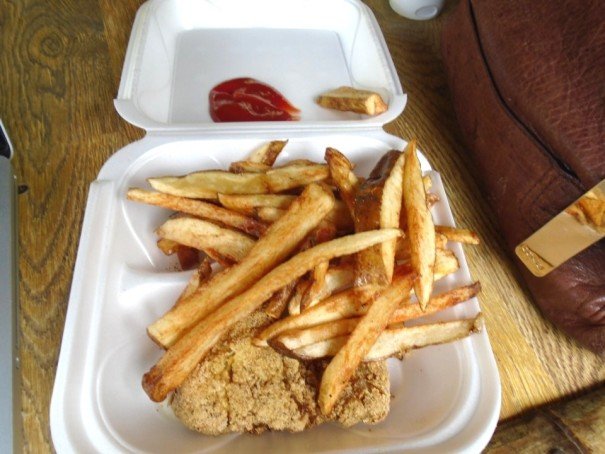
There Is Fried Fish on the Road Back to the Land

There Is Fried Fish on the Road Back to the Land
Catfish in the ACE Basin
It’s hard to be a morning person in the muggy spring of the ACE Basin. Dripping with Spanish moss and teeming with life growing on other life, this vast swamp (formed by the excesses of the Ashepoo, Combahee, and Edisto Rivers—hence ACE) stretches across much of the lower coast of South Carolina, from Charleston to Hilton Head. Many resort communities, built on the islands peppering the Atlantic and in the remains of massive rice plantations, conquer the humidity with air conditioning and sweet tea. But here in the dead of the swamp, the heat-blanket air, thick with last night’s grimy rainwater, makes everything slow and heavy. Which is to say, thinking I could get up at seven, walk out to the open-air bar beside my plywood shack guesthouse, and grab some breakfast before tooling around the swamps was a big mistake.
I spend a good two-to-three hours scribbling in my bright red notebook and listening to work drums and the shuffle of groggy villagers waking up before other folks start to congregate around the café with a bit of hunger (but much more sleep) in their eyes. I have no idea what breakfast will be. But that’s par for the course in the town of Oyotunji.
A self-declared independent nation, African-American nationalists carved Oyotunji out of a bit of Sheldon, South Carolina’s old Tamale plantation in the 1970s. These men, disenchanted with the pervasive racism of American society even after the civil rights movement, were determined to create their own community, defined in its culture and governance by Yoruba (West African) traditions, ostensibly picking up where their ancestors left off before being dragged into slavery. Over the past forty-some years, the city-state has gone through spurts of overpopulation and depopulation, ideological shifts and dynastic transitions (they’re ruled by a divinely ordained king—the Oba). But at its inception and now again, the community’s anchored in a back-to-the-land ethos.
The village is dotted with micro-gardens, and every day, folks trundle down to the rivers to see what they can pull out of the swamp. Some of the twenty-odd residents aren’t into this nature provides philosophy, so they still live on Entenmann’s sweets from the convenience store out on the highway (much to the reigning Oba Adefunmi II’s chagrin). Likewise, the breakfast menu at this nascent guesthouse (a bid to capitalize on interest in their community from spiritualists and nosy outsiders like myself) is sometimes just processed cheese on a bun with some peppers and onions slapped in for good measure. But sometimes, like today, it’s whatever the young man trudging up from the river has in his white bucket.
It’s a slew of catfish and white fish. Boku, a priest initiate and the local chef par excellence, jumps up, gutting and slicing and battering and frying-up the fish with some French fries. It’s a slow process, as he handles each fillet more like a meditating dervish than a line cook, but it’s worth the wait. There’s something especially juicy about fish when you get to eat it within half an hour of its death (that’s the appeal of ikizukuri, but I could never manage to eat a fish while still alive). It’s also psychologically appealing to know exactly who breaded and fried the fish, and with what. There’s something communal about sitting around and shooting shit as Boku slings each cut into a Styrofoam container. And I suppose this is the promise of the back-to-the-land ethos—the restoration of flavor, knowledge, and community in your food.
The problem is that while I experience this sense of community many times over a week at Oyotunji (crab bakes with children running underfoot and venison roasts while Michael Jackson movies play on a projector in the center of the open-air bar), as of yet it’s unreliable. Oyotunji isn’t self-sustaining—far from it. WalMart products still abound, despite the Oba’s best efforts to get everyone to eat a handful of mustard greens or kale from the micro-gardens with each meal.
The Oba doesn’t yet grow enough crops to feed the village, but he’s getting there. Yet the real problem isn’t a lack of resources. It’s the fact that breaking old eating habits and tastes is hard. And the fact that while back-to-the-land-ism is a big part of this village, not everyone’s as willing or able to be a part of that element of life. That’s not just a problem at Oyotunji. It’s a recurrent spoiler in almost every one of America’s countless intentional communities, where utopian visions of a natural life give way after a few years to the tempting eases and artificial deliciousness of modern life. For now, Oyotunji is maybe one-fourth fresh catfish and three-fourths fried dough. But that’s not so bad in the grand scheme of things. Even that’s more than I get in my usual, ho-hum Brooklyn life. So I embrace this sizzling, moist cut of fish and the drugged-out peace of a slow-moving, shit-shooting swamp morning, while I can.